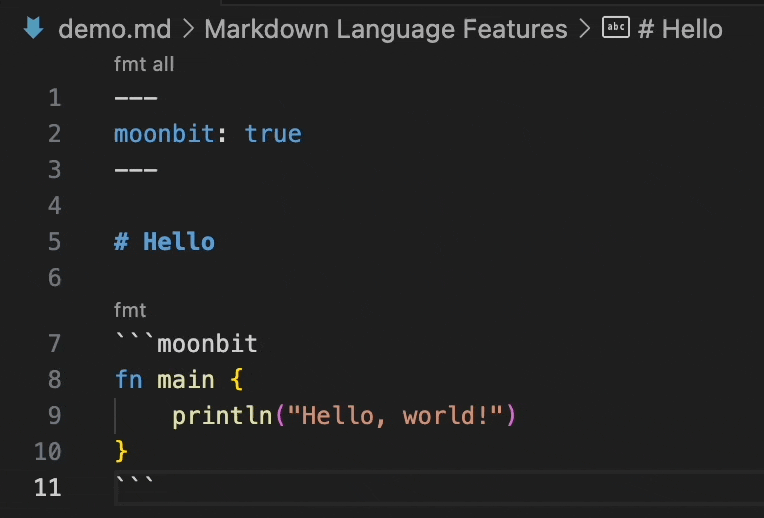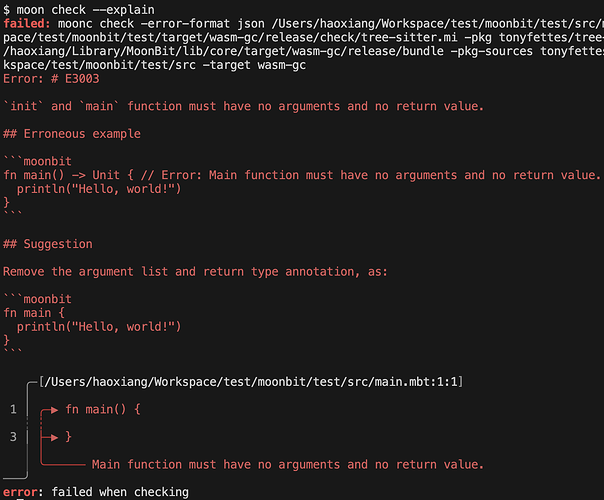2025-03-10
Language Updates
Pattern Guards
Pattern guards can be specified by appending if ... to a pattern. A branch with a pattern guard will only execute if the matched value satisfies the pattern and the guard condition evaluates to true. If the guard evaluates to false, the match will continue to the next applicable branch.
This feature simplifies code using pattern matching. For example, simplifying arithmetic expressions:
fn simplify(e : Expr) -> Expr {
match e {
Add(e1, Lit(0)) => e1
Sub(e1, e2) if e1 == e2 => Lit(0)
// ^^^^^^^^^^^ pattern guard
_ => e
}
}
Pattern guards can also be used with the is expression to introduce new variables. For example:
fn json_get_key(json : Json, key : String) -> Json! {
match json {
Object(map) if map[key] is Some(value) => value
_ => fail!("key not found: \{key}")
}
}
Attribute Syntax
Attribute syntax is now supported as a replacement for the old @alert deprecated "message" pragmas. Each attribute must be on a separate line, and line breaks are not allowed within attributes.
Supported attributes:
#deprecated("message")– Marks a function as deprecated and displays a message when used.#coverage.skip– Excludes a function from coverage testing.
The old pragma syntax will be removed in the future.
#deprecated("use function g instead")
#coverage.skip
fn f() -> Unit {
...
}
Bytes Type Supports String Literals for Initialization and Assignment
The Bytes type now supports initialization and assignment using string literals. The string is stored as UTF-8 encoded Bytes. For example:
fn main {
let xs : Bytes = "123"
let ys : Bytes = "你好,世界"
}
enum Supports Custom Tag Values
Enums now support custom tag values, which is useful when interfacing with native C FFI. For example, using the open syscall:
enum OpenFlag {
O_RDONLY = 0x00
O_WRONLY = 0x01
O_RDWR = 0x02
}
extern "c" fn open(path : Bytes, flag : OpenFlag) -> Int = "open"
test {
let path : Bytes = "tmp.txt"
let fd = open(path, O_RDONLY)
}
Enhanced const Declarations
const now supports:
- Referencing other constants.
- Arithmetic, bitwise, and comparison operations on built-in types.
Example:
const A : Int = 1 + 2 * 3
const B : Int = A * 6
Deprecating Implicit Trait Implementation via Methods
Implicit trait implementation via methods is now deprecated. To implement a trait for a type, an explicit impl block must be used.
// Implicitly implementing Show for T (deprecated)
fn T::output(self : T, logger : &Logger) -> Unit {
...
}
// You should migrate to explicit implementation
impl Show for T with output(Self : T, logger : &Logger) -> Unit {
...
}
Removed Direct Invocation of fn T::f(..)
Direct invocation of fn T::f(..) has been removed, following prior deprecation warnings. In the future:
- Methods defined as
fn f(self : T, ..)can be used as normal functions. - Methods written as
fn T::f(..)must be called usingT::f(..)orx.f(..)syntax.
For more details on the new semantics, see GitHub PR #1472.
Splitting Part of the Native Backend Runtime
A portion of the Native backend runtime has been moved into a separate C file located at $MOON_HOME/lib/runtime.c. If you use a custom build process, such as compiling the C file manually, ensure this file is included during compilation.
LLVM Backend Released for Bleeding-Edge Toolchain
The LLVM backend is now available in the bleeding-edge toolchain. Currently, it supports x86_64 Linux and ARM64 macOS. To install the bleeding-edge version of MoonBit, run:
curl -fsSL https://cli.moonbitlang.com/install/unix.sh | bash -s 'bleeding'
You can then enable the LLVM backend during build, test, and run phases by passing the --target llvm option. Example:
moon build --target llvm
Build System Updates
-
Added
moon check --explain, which provides detailed information about error codes.
-
Added a
"native-stub"configuration inmoon.pkg.jsonto specify C stub files used in a package. These stubs are built and linked automatically during compilation. If your project previously included C stub files incc-flags, you can now declare these C stub files in the"native-stub"field. -
Relaxed the
moon publishrequirement to passmoon check. Ifcheckfails, users will be prompted whether they want to proceed with publishing.
IDE Updates
- Embedded MoonBit code blocks in Markdown now support formatting. Users can format MoonBit code inside Markdown using the MoonBit plugin.

